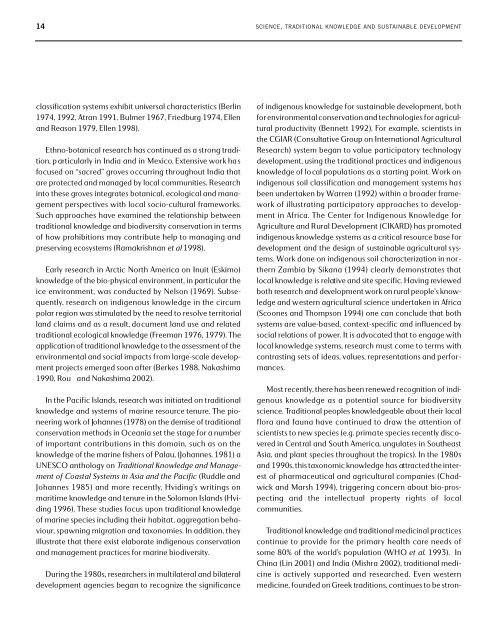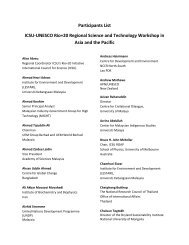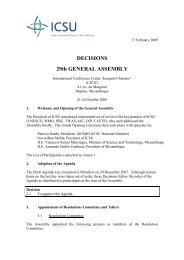Science, Traditional Knowledge and Sustainable Development
Science, Traditional Knowledge and Sustainable Development
Science, Traditional Knowledge and Sustainable Development
Create successful ePaper yourself
Turn your PDF publications into a flip-book with our unique Google optimized e-Paper software.
14<br />
classification systems exhibit universal characteristics (Berlin<br />
1974, 1992, Atran 1991, Bulmer 1967, Friedburg 1974, Ellen<br />
<strong>and</strong> Reason 1979, Ellen 1998).<br />
Ethno-botanical research has continued as a strong tradition,<br />
p articularly in India <strong>and</strong> in Mexico. Extensive work has<br />
focused on “sacred” groves occurring throughout India that<br />
are protected <strong>and</strong> managed by local communities. Research<br />
into these groves integrates botanical, ecological <strong>and</strong> management<br />
pe rs pe c tives with local soc i o - cu l tural fram ewo r ks .<br />
Such approa c h es have examined the re l ati o n ship be twe e n<br />
traditional knowledge <strong>and</strong> biodiversity conservation in terms<br />
of how proh i b i tions may co n tr i b ute help to managing an d<br />
preserving ecosystems (Ramakrishnan et al 1998).<br />
Early res e arch in Arc tic No r th America on Inuit (Esk i m o )<br />
knowledge of the bio-physical environment, in particular the<br />
i ce env i ro n m e n t, was co n du c ted by Nelson (1969). Subseq<br />
u e n tl y, res e arch on indigenous knowledge in the circum<br />
polar region was stimulated by the need to resolve territorial<br />
l<strong>and</strong> claims <strong>and</strong> as a result, document l<strong>and</strong> use <strong>and</strong> related<br />
traditional ecological knowledge (Freeman 1976, 1979). The<br />
application of traditional knowledge to the assessment of the<br />
environmental <strong>and</strong> social impacts from large-scale development<br />
projects emerged soon after (Berkes 1988, Nakashima<br />
1990, Roué <strong>and</strong> Nakashima 2002).<br />
In the Pacific Isl<strong>and</strong>s, research was initiated on traditional<br />
knowledge <strong>and</strong> systems of marine resource tenure. The pioneering<br />
work of Johannes (1978) on the demise of traditional<br />
conservation methods in Oceania set the stage for a number<br />
of impo r tant co n tr i b utions in this domain, such as on th e<br />
knowledge of the marine fishers of Palau, (Johannes, 1981) a<br />
UNESCO anthology on <strong>Traditional</strong> <strong>Knowledge</strong> <strong>and</strong> Management<br />
of Coastal Systems in Asia <strong>and</strong> the Pacific (Ruddle <strong>and</strong><br />
Joh an n es 1985) <strong>and</strong> more re ce n tl y, Hv i d i n g ’s writings on<br />
maritime knowledge <strong>and</strong> tenure in the Solomon Isl<strong>and</strong>s (Hviding<br />
1996). These studies focus upon traditional knowledge<br />
of marine species including their habitat, aggregation behaviour,<br />
spawning migration <strong>and</strong> taxonomies. In addition, they<br />
illustrate that there exist elaborate indigenous conservation<br />
<strong>and</strong> management practices for marine biodiversity.<br />
During the 1980s, researchers in multilateral <strong>and</strong> bilateral<br />
d evelopment agencies be g an to re cogn i ze the sign i fi can ce<br />
S C I E N C E, T R A D I T I O N A L K N O W L E D G E A N D S U S TA I N A B L E D E V E L O P M E N T<br />
of indigenous knowledge for sustainable development, both<br />
for environmental conservation <strong>and</strong> technologies for agricultural<br />
produ c tiv i ty (Bennett 1992). For exam ple, scientists in<br />
the CGIAR (Consultative Group on International Agricultural<br />
Res e arch) sys tem be g an to value par ti c i pato ry te c h n ol ogy<br />
development, using the traditional practices <strong>and</strong> indigenous<br />
knowledge of lo cal populations as a starting point. Work on<br />
indigenous soil classification <strong>and</strong> management systems has<br />
been undertaken by Warren (1992) within a broader framework<br />
of illus trating par ti c i pato ry approa c h es to deve l o pment<br />
in Afr i ca. The Ce n ter for Indigenous Kn owledge fo r<br />
Agriculture <strong>and</strong> Rural <strong>Development</strong> (CIKARD) has promoted<br />
indigenous knowledge systems as a critical resource base for<br />
development <strong>and</strong> the design of sustainable agricultural systems.<br />
Work done on indigenous soil characterization in northern<br />
Zambia by Si kana (1994) clearly demonstrates th at<br />
local knowledge is relative <strong>and</strong> site specific. Having reviewed<br />
both research <strong>and</strong> development work on rural people’s knowledge<br />
<strong>and</strong> western agricultural science undertaken in Africa<br />
(Scoones <strong>and</strong> Thompson 1994) one can conclude that both<br />
systems are value-based, context-specific <strong>and</strong> influenced by<br />
social relations of power. It is advocated that to engage with<br />
local knowledge systems, research must come to terms with<br />
contrasting sets of ideas, values, representations <strong>and</strong> performances.<br />
Most recently, there has been renewed recognition of indig<br />
e n o us knowledge as a po te n tial source for biod ive rs i ty<br />
science. <strong>Traditional</strong> peoples knowledgeable about their local<br />
fl o ra <strong>and</strong> fa una have co n tinued to draw the atte n tion of<br />
scientists to new species (e.g. primate species recently discovered<br />
in Central <strong>and</strong> South America, ungulates in Southeast<br />
Asia, <strong>and</strong> plant species throughout the tropics). In the 1980s<br />
<strong>and</strong> 1990s, this taxonomic knowledge has attracted the interest<br />
of ph ar m a ce uti cal <strong>and</strong> agr i cu l tural co m pan i es (Ch a dwick<br />
<strong>and</strong> Marsh 1994), triggering co n cern abo ut bio-pro spe<br />
c ting <strong>and</strong> the inte l l e c tual pro pe r ty rights of loca l<br />
communities.<br />
<strong>Traditional</strong> knowledge <strong>and</strong> traditional medicinal practices<br />
co n tinue to provide for the primary health care needs of<br />
some 80% of the wo r l d ’s po p u l ation (WHO et al. 1993). In<br />
China (Lin 2001) <strong>and</strong> India (Mishra 2002), traditional medicine<br />
is actively suppo r ted <strong>and</strong> res e arched. Even wes te r n<br />
medicine, founded on Greek traditions, continues to be stron-




